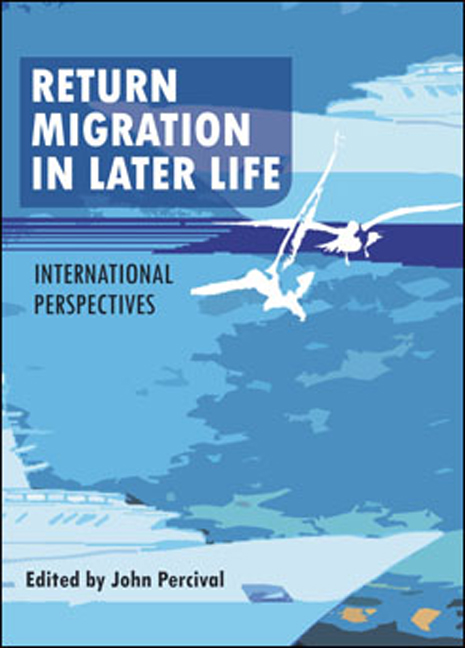Book contents
- Frontmatter
- Contents
- List of tables and figures
- Notes on contributors
- Acknowledgements
- one Charting the waters: return migration in later life
- two Older immigrants leaving Sweden
- three Place and residence attachments in Canada’s older population
- four Ageing immigrants and the question of return: new answers to an old dilemma?
- five Caribbean return migration in later life: family issues and transnational experiences as influential pre-retirement factors
- six ‘We belong to the land’: British immigrants in Australia contemplating or realising their return ‘home’ in later life
- seven Diasporic returns to the city: Anglo-Indian and Jewish visits to Calcutta in later life
- eight Returning to ‘roots’: Estonian-Australian child migrants visiting the homeland
- nine Ageing in the ancestral homeland: ethno-biographical reflections on return migration in later life
- ten ‘The past is a foreign country’: vulnerability to mental illness among return migrants
- eleven The blues of the ageing retornados: narratives on the return to Chile
- twelve Concluding reflections
- Endnotes
- Index
five - Caribbean return migration in later life: family issues and transnational experiences as influential pre-retirement factors
Published online by Cambridge University Press: 01 February 2022
- Frontmatter
- Contents
- List of tables and figures
- Notes on contributors
- Acknowledgements
- one Charting the waters: return migration in later life
- two Older immigrants leaving Sweden
- three Place and residence attachments in Canada’s older population
- four Ageing immigrants and the question of return: new answers to an old dilemma?
- five Caribbean return migration in later life: family issues and transnational experiences as influential pre-retirement factors
- six ‘We belong to the land’: British immigrants in Australia contemplating or realising their return ‘home’ in later life
- seven Diasporic returns to the city: Anglo-Indian and Jewish visits to Calcutta in later life
- eight Returning to ‘roots’: Estonian-Australian child migrants visiting the homeland
- nine Ageing in the ancestral homeland: ethno-biographical reflections on return migration in later life
- ten ‘The past is a foreign country’: vulnerability to mental illness among return migrants
- eleven The blues of the ageing retornados: narratives on the return to Chile
- twelve Concluding reflections
- Endnotes
- Index
Summary
Introduction
In this chapter we widen the scope of research enquiry into Caribbean return migration in later life and empirically examine the case of Caribbean pre-retirement and retirement return migration so that the behavioural dynamics of retirement return migration are explained more completely, if contingently. The migrant's flexibility of options is given more credence, family ties and obligations are shown to definitely ‘matter’ and transnational experiences and practices are additional influential determining factors for retirement-related return migration. In short, we seek to expand our understanding of the patterns and processes of lifecourse planning that underline retirement return migration in the contemporary Caribbean. In so doing, our account offers conceptual explanations that are more complex and flexible in terms of timing, motives and mobilities. First, however, the contextual background is forwarded, before proceeding with the identification (and examination) of the behavioural dynamics of Caribbean return migration in later life.
For the post-1948 ‘Windrush generation’ of British West Indian emigrants (Peach, 1968; Lowenthal, 1972), return migration in later life has commonly been believed to be directly related to the timing of retirement in the overseas destination to which these now-elderly retirees initially emigrated; most frequently, the UK or North America – the US and Canada (Gmelch, 1992; Byron, 1999; Goulebourne, 1999). After all, many emigrated to seek better lives for themselves, their partners and children, while retaining a deeply-felt sense of belonging to the Caribbean homeland they left behind (Philpott, 1973; Fog Olwig, 2005). Also, many retained an intention to return, eventually, with retirement being a significant lifecourse event that prompted thoughts of a permanent return as a culmination of their overseas migration experience.
US-based research on ‘amenity-retirement migration’, versus ‘assistance-migration’ and ‘spouse-absence migration’ (Wiseman and Roseman, 1979; Litwak and Longino, 1987; Walters, 2000; Bradley, 2011), finds there are a variety of causes and reasons for such later-life migration decision making, though these authors were explicitly dealing with internal migration within the US. Older movers in the US are found to be a heterogeneous mix of migrant types with decidedly different lifecourse trajectories, and varying familial/dependent relationships. The needs and motivations underlying this later-life migration of older people, therefore, are conditional on many differing situations and lifecourse transitions, so that the timing of such residential relocations is by no means generalisable and there are no definitive stages in the decision making that can be viewed as logical temporal steps.
- Type
- Chapter
- Information
- Return Migration in Later LifeInternational Perspectives, pp. 89 - 112Publisher: Bristol University PressPrint publication year: 2013

